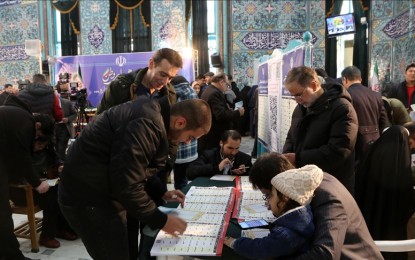
POLL WATCH. Voting for the 12th term parliamentary elections continues in Iran on Sunday (March 3, 2024). More than 15,000 candidates were vying for 290 seats in the parliament. (Anadolu)
TEHRAN – Vote count continued on Sunday, two days after elections for Iran’s parliament and the top clerical assembly.
Mohsen Eslami, the spokesperson for Iran’s election headquarters, told reporters on Sunday the results of 231 seats in parliament and 72 seats in the Assembly of Experts had been finalized.
More than 15,000 candidates were vying for 290 seats in the parliament (Majlis), while 144 candidates ran for the 88-member clerical body that appoints the country’s Supreme Leader.
Of the country's 87 million people, more than 61 million were eligible to vote in the elections held on Friday.
The unofficial voter turnout was just over 41 percent, slightly lower than 42.4 percent in the 2020 parliamentary polls, the lowest since the 1979 revolution.
Turnout in the capital was 25 percent, according to unofficial figures cited by local media, lower than in the past elections.
The highest percentage of voting -- 64.3 -- was recorded in central Iran's Kohgiluyeh and Boyer-Ahmad province.
Eslami said elections on some seats in the capital Tehran and 14 other provinces will be held again. According to Iran’s election law, each candidate must be able to procure at least 20 percent of total votes to gain the parliamentary seat.
Veteran conservative lawmaker Mahmoud Nabavian garnered 545,805 votes in Tehran, followed by another senior lawmaker Hamid Resaee and journalist-turned-lawmaker Amir Hossein Sabiti.
In a big surprise, however, former parliament speaker and prominent conservative politician Mohammad Baqer Ghalibaf came fourth with 409,808 votes. In the 2020 parliamentary polls, he was leading the charts with 1.265 million votes.
It is being said that the number of invalid votes was high this time, with some reports putting it at over 10 percent of the total vote count.
Reformists did not announce any alliance this year, but some reformists joined hands with others in an attempt to challenge conservatives and hardliners.
In the run-up to the polls, Supreme Leader Ayatollah Ali Khamenei had called for massive participation, describing elections as “the main pillar of the Islamic Republic.”
In elections for the Assembly of Experts, the biggest surprise this time was Sadeq Amoli Larijani, who failed to secure a seat. The former judiciary chief currently heads the Expediency Discernment Council, an influential administrative assembly.
Former President Hassan Rouhani, who had applied for a seat in the clerical assembly, was disqualified by the Guardian Council, the powerful vetting body. (Anadolu)
